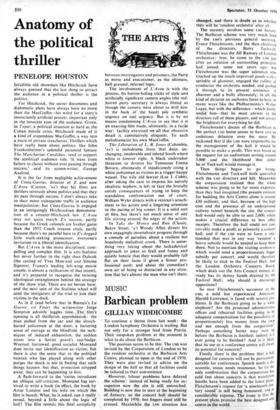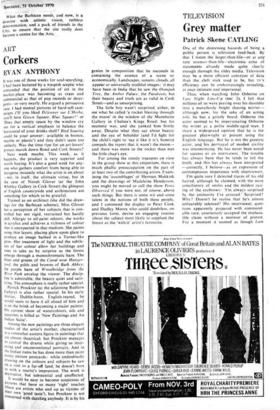MUSIC Barbican problem
GILLIAN WIDDICOMBE
To continue a theme from last week : the London Symphony Orchestra is waiting. But not only for a stronger lead from Previn. Their unspoken problem at the moment is what to do about the Barbican.
The position seems to be this. The 1st) was invited by the Corporation of London to be the resident orchestra at the Barbican Arts Centre, planned to open at the end of 1970. They were also invited to advise on the design of the hall so that all facilities could be tailored to their convenience.
However, labour problems have delayed the scheme: instead of being ready for oc- cupation now the site is still untouched. Building is now due to start at the beginning of January, so the concert hall should 'be completed by 1976; but fingers must still be crossed. Meanwhile the is° situation has changed, and there is doubt as to whether they will be 'resident orchestra' after all.
The mystery involves some Lso history. The Barbican scheme was very much bred by the Lso's previous general secretary, Ernest Fleischmann, and the then chairman of the directors, Barry Tuckwell. Fleischmann was the Alf Ramsey of London orchestras: true, be came to the Lso just after an infusion of outstanding principals had joined, some ten years ago; but Fleischmann was the super salesman who touched up the much improved goods with a sprinkle of glamour, engaged the calibre of conductor the orchestra needed, and pushed it through to its present eminence. A charmer and a bully alternately; in all, the kind of dictator an orchestra loves to hate: in many ways like the Philharmonia's Walter Legge. but with the difference—which finally undid him—that he must answer to the directors (all of them players, and not always the brightest) for everything he did.
Fleischmann's dream of the Barbican as the perfect Lso home seems to have cast an ambitious delusion over his sums. He reckoned that if the LSO were responsible for the management of the ball it would be possible to make a profit. This was based on the request for an auditorium seating around 3,000 and the likelihood that either he or Tuckwell would manage it.
Then things began to go wrong. Fleischmann and Tuckwell both quarrelled with the Lso directors and left. Meanwhile the corporation realised that the whole scheme was going to be far more expensive than they had imagined (the present estimate for building the Arts Centre alone is around £30 million); and that, because of the high cost and the presence of an underground railway tunnel beneath the site, the concert hall would only be able to seat 2,000, which makes a crucial difference to box office receipts. Therefore the hall could not con- ceivably make a profit as primarily a concert hall; and if the 'so were to form a rela- tionship that was in any way 'resident' a heavy subsidy would be needed to keep them there. Not to mention the visiting orchestras which would need a proportionately bigger subsidy per concert, and would therefore be likely to stick to the Festival Hall. And the London Orchestra Concerts Board, which deals out the Arts Council money, al- ready has its skinny hands drained by the Festival Hall: why should it encourage opposition?
So now Fleischmann's successor at the Lso, a mild but experienced American, Harold Lawrence, is faced with several pro- blems. Is the Barbican going to be a white elephant? Are the promised administrative offices and rehearsal facilities going to be adequate compensation for the possibility of proportionately less money from the 001 and not enough from the corporation? Perhaps something better may, turn up before the Barbican is finished; indeed, is it
ever going to be finished? And is it likely that its use as a conference centre will dwarf its potential for concerts?
Finally there is the problem that a hall designed for concerts will not be particularly suitable for conferences. Speech needs a dry
acoustic, music needs resonance. So far the only confirmation that the corporation has cold feet about concerts is that translation booths have been added to the latest plans, Fleischmann's request for 'a nineteenth cen- tury sound' is still being honoured, and at considerable expense. The irony is that the present plans promise the best designed arts centre in the world. x ;
What the Barbican needs, and now, is a director with artistic vision, ruthless determination, and a pack of friends in the City, to ensure that the site really does become a centre for the Arts.











































 Previous page
Previous page